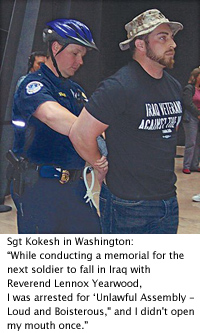Submitted by Jon Truskey:
 Corps accused of ‘muzzle’ tactics:
Corps accused of ‘muzzle’ tactics:
Iraq war protest is reason, ex-Marine says
Thursday, May 31, 2007
Stephen Koff
Plain Dealer Bureau Chief
Washington – Adam Kokesh has an honorable discharge from the Marines, commendations for his service under enemy fire in Fallujah, a self-taught knowledge of Arabic that he used in running a checkpoint in Iraq – and a date Monday to face Marine Corps officials.
They don’t like the way that he and other former Marines protest the Iraq war, running around Washington wearing camouflage uniforms and voicing disrespect.
So in a move that Kokesh, other veterans and several attorneys find unusual, the Marine Corps has ordered him to appear at a hearing to consider throwing him out – even though he’s already out – with an “other than honorable” discharge.
Kokesh says they just want to shut him up.
“It seems like these guys were over in Iraq fighting for their country, and now they’re being brought up on charges for exercising the free speech they were fighting for,” said Marv Johnson, legislative counsel for the American Civil Liberties Union.
Kokesh’s attorney, Michael Lebowitz, says the case “is about the Marine Corps seeking to stifle critics of the Iraq policy.”
Lebowitz, a graduate of Mentor High School, Kent State University and Case Western Reserve University’s law school, and a former paratrooper, will represent Kokesh on Monday before the Marine Corps Mobilization Command in Kansas City.
It might seem odd that a veteran could be subject to such sanctions. But like hundreds of thousands of veterans who figured their service was over, Kokesh is subject to recall as a member of the Individual Ready Reserve, a category most soldiers and Marines fall in for a period after discharge. The IRR, which critics refer to as a “backdoor draft,” provides a pool of troops that can be reactivated if needed.
And according to the Marines, that means former Marines like Kokesh must behave as Marines as long as they’re even subject to IRR activation. Marines officials would not discuss Kokesh’s case specifically.
Kokesh and a band of contemporaries roamed Washington in camouflage March 19, acting as if they were on military patrol.
On March 29, a Marine major sent him an e-mail to tell him he was being investigated for misconduct by appearing at a political event in uniform. Kokesh responded, telling the major what he thought, and using an expletive to do so. That resulted in an additional misconduct charge.
These accusations were brought under the Uniform Code of Military Justice, which applies solely to service members.
“I can’t see where they have jurisdiction to do this,” Keith Scherer, a Chicago-based attorney, said.
A Marine spokesman, Gunnery Sgt. Chad Homan, said that anyone subject to call-up in the IRR is “still obligated to the Marine Corps,” which means following Marine rules.
Kokesh, who grew up in New Mexico and lives in Washington, D.C., was one of three veterans cited in the Marines’ inquiry and the first to have a hearing.
Former Marine Liam Madden of Boston, who is active in the anti-war movement, declined through an intermediary to comment.
The third former Marine, Cloy Richards of Missouri, has an 80 percent combat disability, according to his mother, Tina Richards, herself an anti-war activist. She says he feared losing most of his benefits by protesting in uniform, so he agreed not to for the next year and a half, which will take him through the end of any possible IRR call-up.
Kokesh does not pretend to be an angel. He brought home a pistol from Iraq; he says he bought it from a policeman there, but it was in violation of rules and it prevented him from returning on a second Iraq tour that he wanted. Though he had risen to the rank of sergeant after 3½ years in the Reserves, he was demoted to corporal and soon thereafter discharged honorably – with a re-enlistment code that basically said, “you can’t re-enlist.”
This means the Marines don’t want him back, yet have charged him as if he is back. Not only that, he and his attorney note, but June 18 is when any possible obligation to the IRR would legally end.
But first, he must face the charges. “Which is,” Kokesh notes, “the most ironic point.”
Thank you Irag Veterans Against the War, Kansas City Infozine News, Crooks and Liars and Wonkette
